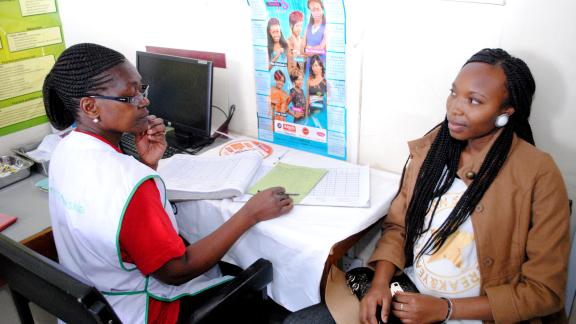Four years ago governments and global health providers came up with a goal for an additional 120 million women to have access to contraception by 2020.
The goal known as FP2020 was agreed at a summit about family planning, which was held in London in 2012.
As we are almost half way through the time set to reach the target organisations around the globe are considering whether we are on track.
Today marks the start of the meeting of the FP2020 Reference Group which will review progress in reaching the goals and will also look at the key challenges which are blocking progress.
Over the next few days we will be posting a series of case studies which highlight the difference that family planning can make to people’s lives, starting with Elizabeth Odhiambo at the Makadara Health Facility in Kenya.
Focus on Family Planning 1: Getting Good Service in the Makadara Health Facility
Elizabeth Odhiambo is an Officer in Charge of the Makadara Health Facility in Kenya. For over ten years, Elizabeth has been overseeing the operation of the facility.
“In the years I have worked in the facility,” Elizabeth says, “I have seen more and more women and men embracing family planning methods. We receive an overwhelming number of women and men seeking the services everyday. I have also seen more men taking a role in family planning services. Many couples come seeking information and services on family planning. Many women and men are able to get modern family planning services for free. Young people seek the services in the area because the facility staff have a good attitude to all clients.”
The Makadara Health Facility is perhaps one of the most effective public health government facilities in Eastern Nairobi. In the recent years, it has earned an excellent reputation for having one of the leading Family Planning and Maternal Care services in Nairobi County, Kenya. Where preventive and curative treatment is concerned, the hospital boasts an exceptional record, evidenced by patients’ testimonials and referral cases. The facility has a total number of 25 nurses for all services, including 24 hour maternity services. The facility delivers between 200-250 babies every month and has 14 nurses rotating in two shifts. The facility is also the location of the sub-county drug depot, which is of huge benefit to the centre. Although the depot supplies drugs to 40 other health facilities in the sub-county, the Makadara Health Facility is a direct beneficiary. This facility is able to meet the family planning needs of both men and women in the area, with a variety of family planning methods to choose from, plus availability, affordability, acceptability and accessibility.
“We are able to reach out and support more people with family planning methods because of the depot. For example, there are many suppliers, such as bars and youth groups, who collect condoms from the depot on a monthly basis,” Elizabeth says.
The demand for modern methods of contraception is very high in Makadara:
“Some of the commonly requested methods include IUD, injectables, male condoms and pills, and although the female condom is not commonly requested, we always stock some for the few that need them.”
According to the Kenya Democratic Health Survey (KDHS) 2014, there has been an increase in the contraceptive prevalence rate from 46% in 2008/9 to the current 58%. This increase demonstrates the growing acceptance of contraceptives in the country.
This is also evident in the Makadara Health Facility, Elizabeth reveals:
“To us the increase in demand for family planning services and male involvement in family planning has made it easy for medical practitioners to offer services. Perhaps what stands out the most is the fact that many women and men are able to get modern family planning services for free. This kind of exemption makes the facility a one-stop-shop for many patients from the Nairobi Eastern area.”
Although the facility is well equipped with supplies, it does have its challenges. The facility has a shortage of nurses and the ratio of health provider to patient is 1:25. This means staff have limited time available for administering the long-acting contraceptive methods to their patients.
Overall, Elizabeth is really proud of her work and encourages all women and men to make informed decisions about their contraceptive methods:
“Although we hear that other facilities experience stockouts, our facility has been lucky to serve as the sub-county drug depot and is therefore able to meet the FP needs of its clients.”
when
Blog Series
Expanding access
Subject
Contraception








